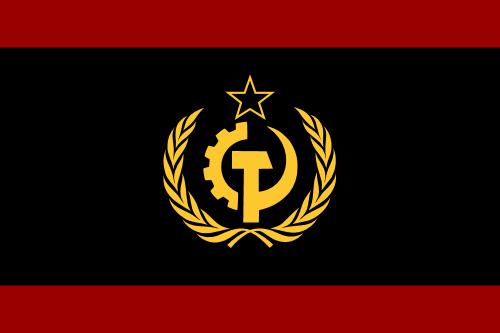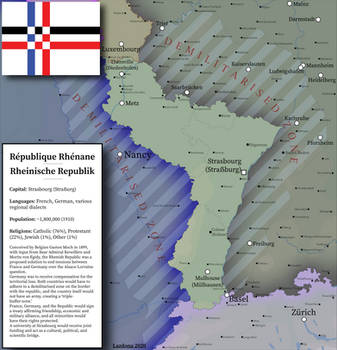ShopDreamUp AI ArtDreamUp
Deviation Actions
Description
Workers Technological Republic of Greater Prussia
Arbeitersteknorepublik Großpreußen
Type: Market Socialist Technocracy
Capital: Volkstadt-am-Spree
Currency: Volksbit (formerly Volksmark)
The Workers Technological Republic of Greater Prussia, otherwise known as "Arbeitersland", "the Teknorepublik" or simply Prussia, is a large, unitary state in northern Europe. Greater Prussia is the result of Soviet intervention during the German Civil War (Nazischlacht, 1943-1945), when Red Army troops arrived in warring Germany to support Leftist elements that had largely secured the north. The initial Prussian Workers Republic (Arbeitersrepublik Preußen) began the Sitzkrieg as a loyal Soviet satellite state, the Soviets' vanguard into Europe-- the Prussians had contentious borders, to say the least: to the south was the United States of Southern Germany, to the west, France, Belgium and the Netherlands, and to the north lay Denmark, all of them A.A.D.C. bulwarks.
Volkstadt-am-Spree's subservience to Moscow only lasted long enough for Prussia to rebuild her military to suitable strength. Beginning in the late 1960s, Prussian leadership began to edge away from the COMINTERN-- increasingly, Premier Wilhelm Klingemann found himself unable to reconcile Prussia's intense nationalism with subordination to an international alliance, least of all one headed up by the Russians. Prussia's independent streak manifested at first as spats in the World Assembly, then as bickering at the annual Kiev Summits from 1968 to 1973, and finally as an official break from the Communist International in 1975. The Prussians remained members of the International Alliance for Friendship and Cooperation, but seceded entirely from the Kiev Summit Organization and no longer were listed as COMINTERN. Prussia found a kinship here, coming from a bizarre place: Yugoslavia.
It was secret to no one that the Prussians had always admired Josip Broz Tito's vocal defiance of the Soviets, only failing to express solidarity with Belgrade thanks to Soviet occupation. Soviet troops had been evicted from their bases in 1973, so there was nothing to hold back the formation of a Yugo-Prussian Alliance. So was created the Fourth International (not to be confused with the Trotskyist organization of the same name), and, with it, so began the Prusso-Russian (or Russo-Prussian) Split.
The major manifestation of the Split in Prussia itself was the advent of Scientific Socialism (Wissenschaftlicher Sozialismus). Scientific Socialism was a market-socialist ideology primarily inspired by the success of Hungarian Goulash Communism, incorporating a uniquely Prussian brand of martial technocracy: wealth redistributed by the state was to advance science, science was to advance the state and the people, the people and the state were to advance science, and so on. Scientific Socialism dictated a martial ideology of "national resistance and the defense of science", something with which Premier Tito got along quite evenly. The alteration in ideology (from "Marxist-Leninist" to "Scientific Socialist") culminated in a name change, from "Prussian Workers Republic" to "Workers Technological Republic of Greater Prussia". It is easy to understand the inclusion of "Technological" in the lengthening list of adjectives, but the Groß in Großpreußen was a bit more purposeful: Prussia was no longer just one in a long list of Soviet satellites, functioning as little more than a staging ground for Soviet troops. Prussia was once again as it had always been before: an expansionary state with a proud martial history, a grand vision for the world, and for its own role in this vision's realization.
Prussia today is at the head of its own Technocratic bloc within Red Europe-- Scientific Yugoslavia is its loyal and close second-fiddle, with the recently-emancipated nations of Czechoslovakia and Hungary also throwing in against the well-disliked Soviets. Prussian culture is forward-thinking, or, rather, upward-thinking: Greater Prussia's is the most-accelerated space program outside of either the U.S.S.R. or Greater United America. Society is extremely high-tech: Prussia was the first nation to formally adopt a cryptocurrency (technically just digitalized Volksmarks, the new cash has come to be called the "Volksbit"), and there are plans for a monorail (or, perhaps, mag-lev) train network across the whole country.
Defense is valued very highly, and it shows: the Arbeitersmarine fields three supercarriers, and the half-Soviet-built military is by now well and on its way to equipment independence, with indigenous technology supplanting and in some cases numerically surpassing Soviet supplies and license-copies. The authoritarian government's role in people's lives has been rolled back considerably as part of the state's rejection of "barracks communism", and a great level of individual liberty is enjoyed by Prussian citizens, who enjoy rights to free expression and purchase light years beyond that under the old regime. Prussia has, as of late, entered into a military/political partnership with Greater United America (based in part on the increased threat of the Soviet Union and on technocratic realpolitik), and is even considering Atlantic Assembly membership, currently listed as an observer state. Yugoslavia and the rest of the Technocratic bloc are opposed, however, and current Premier Reinhard Adenauer is in no particular rush.
Arbeitersteknorepublik Großpreußen
Type: Market Socialist Technocracy
Capital: Volkstadt-am-Spree
Currency: Volksbit (formerly Volksmark)
The Workers Technological Republic of Greater Prussia, otherwise known as "Arbeitersland", "the Teknorepublik" or simply Prussia, is a large, unitary state in northern Europe. Greater Prussia is the result of Soviet intervention during the German Civil War (Nazischlacht, 1943-1945), when Red Army troops arrived in warring Germany to support Leftist elements that had largely secured the north. The initial Prussian Workers Republic (Arbeitersrepublik Preußen) began the Sitzkrieg as a loyal Soviet satellite state, the Soviets' vanguard into Europe-- the Prussians had contentious borders, to say the least: to the south was the United States of Southern Germany, to the west, France, Belgium and the Netherlands, and to the north lay Denmark, all of them A.A.D.C. bulwarks.
Volkstadt-am-Spree's subservience to Moscow only lasted long enough for Prussia to rebuild her military to suitable strength. Beginning in the late 1960s, Prussian leadership began to edge away from the COMINTERN-- increasingly, Premier Wilhelm Klingemann found himself unable to reconcile Prussia's intense nationalism with subordination to an international alliance, least of all one headed up by the Russians. Prussia's independent streak manifested at first as spats in the World Assembly, then as bickering at the annual Kiev Summits from 1968 to 1973, and finally as an official break from the Communist International in 1975. The Prussians remained members of the International Alliance for Friendship and Cooperation, but seceded entirely from the Kiev Summit Organization and no longer were listed as COMINTERN. Prussia found a kinship here, coming from a bizarre place: Yugoslavia.
It was secret to no one that the Prussians had always admired Josip Broz Tito's vocal defiance of the Soviets, only failing to express solidarity with Belgrade thanks to Soviet occupation. Soviet troops had been evicted from their bases in 1973, so there was nothing to hold back the formation of a Yugo-Prussian Alliance. So was created the Fourth International (not to be confused with the Trotskyist organization of the same name), and, with it, so began the Prusso-Russian (or Russo-Prussian) Split.
The major manifestation of the Split in Prussia itself was the advent of Scientific Socialism (Wissenschaftlicher Sozialismus). Scientific Socialism was a market-socialist ideology primarily inspired by the success of Hungarian Goulash Communism, incorporating a uniquely Prussian brand of martial technocracy: wealth redistributed by the state was to advance science, science was to advance the state and the people, the people and the state were to advance science, and so on. Scientific Socialism dictated a martial ideology of "national resistance and the defense of science", something with which Premier Tito got along quite evenly. The alteration in ideology (from "Marxist-Leninist" to "Scientific Socialist") culminated in a name change, from "Prussian Workers Republic" to "Workers Technological Republic of Greater Prussia". It is easy to understand the inclusion of "Technological" in the lengthening list of adjectives, but the Groß in Großpreußen was a bit more purposeful: Prussia was no longer just one in a long list of Soviet satellites, functioning as little more than a staging ground for Soviet troops. Prussia was once again as it had always been before: an expansionary state with a proud martial history, a grand vision for the world, and for its own role in this vision's realization.
Prussia today is at the head of its own Technocratic bloc within Red Europe-- Scientific Yugoslavia is its loyal and close second-fiddle, with the recently-emancipated nations of Czechoslovakia and Hungary also throwing in against the well-disliked Soviets. Prussian culture is forward-thinking, or, rather, upward-thinking: Greater Prussia's is the most-accelerated space program outside of either the U.S.S.R. or Greater United America. Society is extremely high-tech: Prussia was the first nation to formally adopt a cryptocurrency (technically just digitalized Volksmarks, the new cash has come to be called the "Volksbit"), and there are plans for a monorail (or, perhaps, mag-lev) train network across the whole country.
Defense is valued very highly, and it shows: the Arbeitersmarine fields three supercarriers, and the half-Soviet-built military is by now well and on its way to equipment independence, with indigenous technology supplanting and in some cases numerically surpassing Soviet supplies and license-copies. The authoritarian government's role in people's lives has been rolled back considerably as part of the state's rejection of "barracks communism", and a great level of individual liberty is enjoyed by Prussian citizens, who enjoy rights to free expression and purchase light years beyond that under the old regime. Prussia has, as of late, entered into a military/political partnership with Greater United America (based in part on the increased threat of the Soviet Union and on technocratic realpolitik), and is even considering Atlantic Assembly membership, currently listed as an observer state. Yugoslavia and the rest of the Technocratic bloc are opposed, however, and current Premier Reinhard Adenauer is in no particular rush.
Image size
500x333px 15.45 KB
© 2016 - 2024 RtasVader
Comments0
Join the community to add your comment. Already a deviant? Log In



























![Flag of the Hooviet Union [Codexverse]](https://images-wixmp-ed30a86b8c4ca887773594c2.wixmp.com/f/f331e12e-54a8-4254-94e3-99e4f328f6ac/deswlnd-1ce6b101-66e3-4c76-980a-b069e2349dd2.png/v1/crop/w_184)

